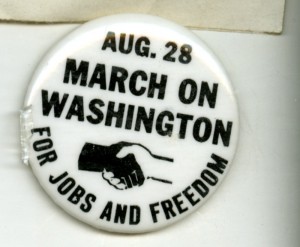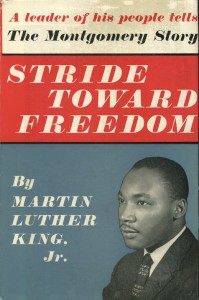Let Freedom Ring
 On the fiftieth anniversary of Martin Luther King, Jr.’s ‘I Have a Dream’ speech in Washington, D.C. on August 28, 1963, and as many in our nation pause today at 3:00 p.m. (Eastern Time) to commemorate this seminal event, it’s good to be reminded also of the many resources available at Williams College related to Dr. King, to the history of the Civil Rights movement in America, and to African-American history and culture in general.
On the fiftieth anniversary of Martin Luther King, Jr.’s ‘I Have a Dream’ speech in Washington, D.C. on August 28, 1963, and as many in our nation pause today at 3:00 p.m. (Eastern Time) to commemorate this seminal event, it’s good to be reminded also of the many resources available at Williams College related to Dr. King, to the history of the Civil Rights movement in America, and to African-American history and culture in general.
 The Chapin Library contains several books by Dr. King, including Stride toward Freedom and Why We Can’t Wait, both signed by the author, the latter also with an inscription by Coretta Scott King, and a special printing of Dr. King’s speech on accepting the 1964 Nobel Peace Prize. Also here is a dramatic 1965 telegram from Dr. King to Congressman Seymour Halpern (one of the co-sponsors of the Voting Rights Act of 1964), in connection with a dispute over Negro disenfranchisement in Mississippi.
The Chapin Library contains several books by Dr. King, including Stride toward Freedom and Why We Can’t Wait, both signed by the author, the latter also with an inscription by Coretta Scott King, and a special printing of Dr. King’s speech on accepting the 1964 Nobel Peace Prize. Also here is a dramatic 1965 telegram from Dr. King to Congressman Seymour Halpern (one of the co-sponsors of the Voting Rights Act of 1964), in connection with a dispute over Negro disenfranchisement in Mississippi.
Extensive holdings from earlier periods trace the arrival of African captives in the New World, the development of slavery in America, and the struggles of African-Americans to claim their civil rights following the Civil War. Among these are works by civil rights activist (and Great Barrington native) W.E.B. Du Bois, who died fifty years ago yesterday, on August 27, 1963. Such resources are available in both the Chapin Library and the Williams College Archives and Special Collections, located in the Southworth Schoolhouse.
In addition, as noted in an earlier post, a recent acquisition by the Chapin Library, the Heritage Collection of Black literature and music formed by Paul Breman, comprises some 4,000 books and recordings and an equal number of pieces of manuscript and ephemera. – WGH
Shown are a button from August 28, 1963, from the Williams College Archives’ image collection related to the march on Washington, and from the Chapin Library’s holdings, the dust-jacket of Stride toward Freedom: The Montgomery Story by Martin Luther King, Jr. (1958).